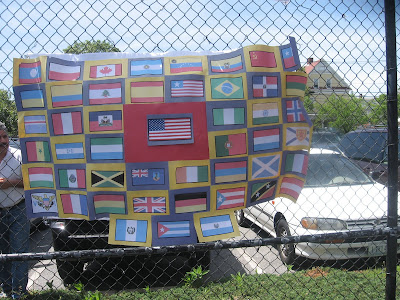

Picture of my son, and flags of countries represented in the parade during multicultural week at their school.
Multicultural event in their school is part of the school's curriculum. Usually each class in the elementary school will focus on one country. This year that decided to celebrate the different cultures that make up Rhode Island. Each child was asked to write about the country of their ancestors and the reason for coming to Rhode Island, this was shared in class. Some students have their parents or grandparents come home to talk about their home land. Parents were asked to send in food for the children to tried, which everyone enjoyed.
On Friday they had a parade of nations. It was very fascinating to see how many countries were represented in their school. At the end of the parade the students lined up outside the school yard and together with their teachers sang the song "We are the World".
Indeed we are the world, as a teacher making a difference in one child can lead to many others. I am very grateful to Dr, August, I have learn so much in her class. This is information that would make me a better teacher and a better person.
I loved my service placement. My classroom teacher is very good with her students. She is an example of a good teacher, although it is a special needs class, it is very organized and the students transition from one activity to another with no problem or chaos. She is always looking for educational but fun activities for them to do. Our last project was writing about our was for the Bay, the students work will be displayed. Most of them wished for a cleaner Bay for the fish to live in. They promise to recycle and pick up their trash so that it would not end up in the Bay.


